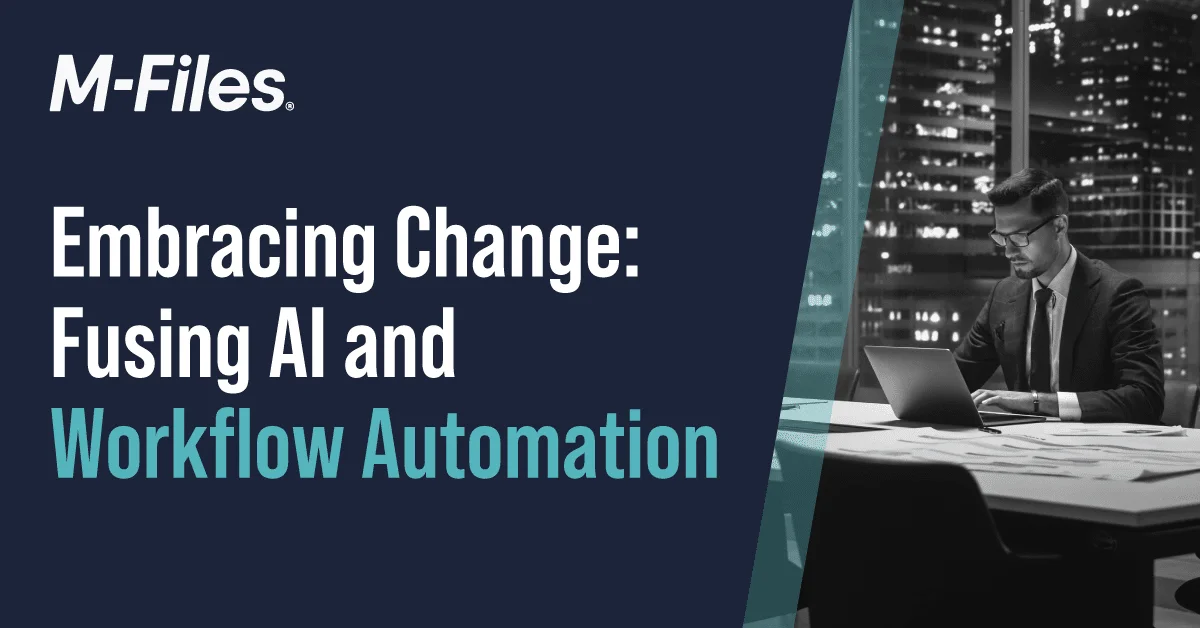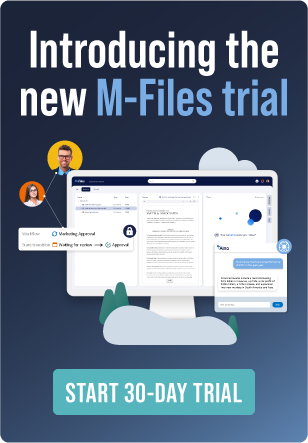Embracing Change: Fusing AI and Workflow Automation

Knowledge workers, hired for their creativity and high level critical thinking, currently find themselves losing time to routine tasks. With 41% of their day devoted to these activities, the global workforce is in dire need of a solution that frees knowledge workers from mundane, time-consuming tasks.
This is where artificial intelligence (AI) and workflow automation shine. Whether it's creating documents, managing workflows, or following a set business process, AI automation ensures that everything happens smoothly without the need for human action.
The Role of AI in Optimizing Workflow Structure
The duo of AI and workflow automation is the future of work. No longer will repetitive tasks waste the time of knowledge workers. They will move past the limitations of manual processes and focus on creative work with their time optimized.
In workflow automation, AI plays a pivotal role in easing processes for knowledge workers. The main role is its ability to alleviate knowledge workers from the burden of unnecessary, time-consuming tasks, improving the overall employee experience.
AI and automation will take over all possible aspects of workflows that can be automated, simplifying them. Routine workflows will become the job of automation software, including document creation and management, filing and organization, and even standard email formatting.
Step-by-step workflows will no longer be the job of workers. Removing this repetition frees up time for workers to focus on their primary tasks and that leads to increased efficiency in the workplace.
The Future of Document Control
Document automation is one of the most powerful tools of workflow automation. AI taking over basic document control, such as formatting, shortens the mundane workflows associated with document management.
Intelligent document creation and organization is one of the greatest benefits of work automation. AI generates documents from pre-approved templates and removes the burden of time-consuming tasks for workers.
Digital document filing systems powered by AI automation make sorting and searching for documents quicker and easier. Automatic organization of electronic file storage speeds up the process and makes it easier to share documents.
Digital document management performed by an automated system is going to make the future of work more task-focused and goal-oriented. Workers will complete projects faster without the risk of errors from manual work.
AI in Workflow Automation: Enhancing, Not Replacing
Concerns persist about digital disruption and automated systems replacing jobs. It's crucial to understand that AI's purpose is to handle uncreative, time-consuming tasks that impede human innovation.
AI is a powerful software tool. It introduces exciting possibilities, from document management to complex business processes. Rather than replacing knowledge workers, AI becomes a catalyst for workflow structure evolution.
It is essential to view AI as a valuable assistant that complements human capabilities, rather than a threat to job security. As AI continues to evolve, it has the potential to further streamline business operations and spark inspiration for knowledge workers.
AI, Workflows, and Security & Compliance
Workflow automation enhances security and compliance. Particularly in industries with stringent regulations, a workflow automation platform can prioritize and automate security measures.
Automated security controls reduce the risk of human error and eliminate the danger of sensitive information leaking. Standardized workflows and document formats ensure that information management is under control and safe.
Collaboration
Workflow automation also improves and eases collaboration. Automated workflows standardize the work done by multiple people and can track tasks or provide clarity on responsibilities.
Knowledge work automation injects structure into collaboration. This ensures that collaborative efforts progress smoothly in a unified manner.
More Than Workflow Automation
Emerging technologies extend the potential of AI to do more than just automate tasks. Knowledge workers can use AI to pose questions, analyze data, and generate content based on samples or prompts.
AI acts as a collaborative partner, helping professionals navigate workflow management with ease, contributing to a more efficient and streamlined knowledge work process.
Workflows and AI
AI and workflow automation are not just trends, they are the next chapter in knowledge work. As knowledge workers embrace automation, the combination of their expertise and autonomous systems lead to increased productivity in the workplace.
AI, Workflows, and Security & Compliance
Workflow automation enhances security and compliance. Particularly in industries with stringent regulations, a workflow automation platform can prioritize and automate security measures.
Automated security controls reduce the risk of human error and eliminate the danger of sensitive information leaking. Standardized workflows and document formats ensure that information management is under control and safe.
FAQ
What is knowledge automation?
Knowledge automation is the use of technology to perform tasks that traditionally require human intelligence and decision-making.
Why should we use automation of knowledge work?
Automation of knowledge work simplifies repetitive tasks and allows professionals to focus on more complex problem-solving aspects of their work.
Why is automation of knowledge work disruptive?
It performs tasks traditionally performed by humans, leading to shifts in job roles, skills, and business processes.
How should business leaders implement decision management in business processes using knowledge automation?
Business leaders should figure out important decision points in their processes and use knowledge automation. By using programs with learning abilities, they can make sure decision-making becomes smarter over time.




